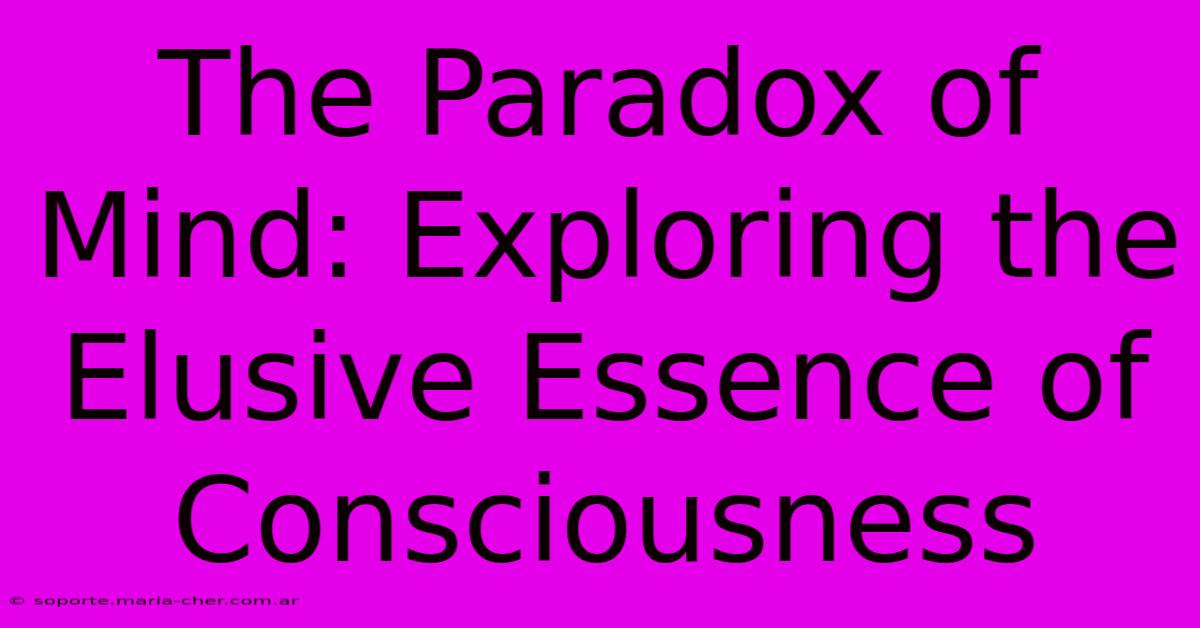The Paradox Of Mind: Exploring The Elusive Essence Of Consciousness

Table of Contents
The Paradox of Mind: Exploring the Elusive Essence of Consciousness
The human mind. A universe of thoughts, feelings, and experiences contained within the confines of our skulls. It's the source of our creativity, our capacity for love and hate, and the very essence of our individual selves. Yet, despite its profound impact on our lives, the nature of consciousness remains one of the most enduring and perplexing mysteries in science and philosophy. This exploration delves into the paradox of mind, investigating the elusive essence of consciousness and the ongoing debate surrounding its origins and nature.
What is Consciousness? Defining the Enigma
Before we dissect the paradox, we must grapple with a fundamental question: what is consciousness? A simple definition proves elusive. Is it simply awareness – the ability to perceive our surroundings and ourselves? Or is it something more profound, encompassing subjective experience, self-awareness, and the capacity for intentional action? Philosophers and scientists have offered a range of perspectives, from materialist explanations grounding consciousness in brain activity to dualist views proposing a separate, non-physical mind.
The Hard Problem of Consciousness
Philosopher David Chalmers famously articulated the "hard problem" of consciousness: explaining how physical processes in the brain give rise to subjective experience – what it feels like to be conscious. We can map brain activity correlating with conscious experience, but this doesn't explain the qualitative aspect, the "what it's like-ness," of feeling pain, seeing red, or experiencing joy. This gap between objective observation and subjective experience lies at the heart of the paradox.
Exploring Different Perspectives on Consciousness
Several prominent theories attempt to unravel the mystery of consciousness:
Materialism/Physicalism:
This dominant view in neuroscience asserts that consciousness is entirely a product of physical processes in the brain. Advances in neuroimaging techniques offer compelling evidence linking specific brain regions and activities to conscious states. However, as mentioned earlier, the "hard problem" remains a significant challenge for materialist accounts.
Dualism:
This perspective posits a separation between mind and body, suggesting that consciousness is a non-physical entity interacting with the physical brain. While intuitively appealing to some, dualism struggles to explain how a non-physical mind could influence the physical world.
Integrated Information Theory (IIT):
IIT proposes that consciousness arises from the complexity and integration of information within a system. The more integrated and complex the system, the higher its level of consciousness. This theory attempts to bridge the gap between physical processes and subjective experience, but it remains a subject of ongoing debate.
Global Workspace Theory (GWT):
GWT suggests that consciousness arises from a global workspace in the brain where information from various modules is integrated and broadcast, making it available to other cognitive processes. This theory emphasizes the role of attention and working memory in shaping conscious experience.
The Implications of Understanding Consciousness
Understanding consciousness holds profound implications for various fields:
- Artificial Intelligence (AI): Creating truly conscious AI requires a deeper understanding of the mechanisms underlying consciousness.
- Medicine: Treating disorders of consciousness, such as coma and vegetative states, necessitates a better grasp of the neural correlates of consciousness.
- Ethics: The nature of consciousness raises crucial ethical questions about animal welfare, the moral status of AI, and the potential for consciousness in other forms of life.
- Philosophy: The paradox of consciousness continues to challenge fundamental assumptions about the nature of reality, the self, and the relationship between mind and matter.
Conclusion: The Ongoing Quest
The paradox of mind remains a compelling challenge, demanding further investigation across multiple disciplines. While a definitive answer remains elusive, ongoing research in neuroscience, philosophy, and computer science continually sheds new light on this fundamental aspect of human existence. The journey towards understanding the elusive essence of consciousness is a testament to our insatiable curiosity and our persistent drive to unravel the deepest mysteries of the universe within and around us. The exploration is far from over, and the path forward promises to be rich in discovery and intellectual excitement.

Thank you for visiting our website wich cover about The Paradox Of Mind: Exploring The Elusive Essence Of Consciousness. We hope the information provided has been useful to you. Feel free to contact us if you have any questions or need further assistance. See you next time and dont miss to bookmark.
Featured Posts
-
Epic Battle A5 Vs A4 Which Wins The Smartphone Crown
Feb 11, 2025
-
Uncover The Secret Unleash The True Dimensions Of Standard Printer Paper
Feb 11, 2025
-
Jewelry Heaven Awaits Unbelievable Monica Vinader Sales For A Limited Time
Feb 11, 2025
-
Discover The Epitome Of Home Perry Homes Masterpiece In Mont Belvieu
Feb 11, 2025
-
Statement Making Hoops Monica Vinaders Linear Studs Transform Ears
Feb 11, 2025
